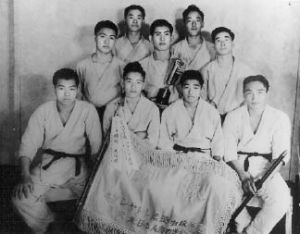Art Koura, almost 90, misses Bainbridge Island. In 1919, his parents, Otohiko and Hatsuko Koura, strapped on their infant son and came here to pick strawberries. They liked it so much that a year later they left their Seattle home to try farming on the island. Six years later, they had as many children and seven acres on High School Road. The farm was successful, and Otohiko became president of the Community Association from 1936 to 1941.
Art walked to Lincoln School (site of Winslow Green) and later to BHS. He was busy with farm, student government, and all sports. And though times were tough, his parents paid to enroll him in lessons of judo, “the flexible way.”
The first Island dojo (learning place) opened in April 1932 in a deserted barn at Crystal Springs. Classes later moved to the Japanese Community Hall in Winslow where the program took off under Yasuyuki Kumagai, age 28. Dojo members were school age.
“Mr. Kumagai was a wonderful man,” Art fondly recalls. “He made it so that instead of becoming a bunch of roughnecks, we followed the judo creed. He taught ethics. He made us bow and respect our elders. That’s why our parents made us go.”
Koura graduated from BHS in 1937. He anchored the football team’s line at right end – all 125 pounds of him! Size didn’t matter to Art. The team was the undefeated champion of the (King, Kitsap and Jefferson) Tri-County league. The players were small, but judo emphasized balance and quickness, not size.
Koura turned down a college scholarship. He helped his father clear new farm land in Manzanita (Meadowmeer). Alien land laws prevented Art’s parents from owning it. Thus U.S.-born Art became owner of 80 acres at age 18.
In December 1941, “A friend heard about Pearl Harbor on his car radio and told me as a casual thing,” Art recalls. “Then Walt (Woodward, Bainbridge Review editor) called and said, ‘You are in deep trouble.’
“‘OK,’” I said, “‘We are berry farmers. We can plow our berries and plant potatoes if it will help.’”
But Art’s father and other Japanese community leaders were hauled away by the FBI, and the rest of the family was uprooted in March 1942 and taken to internment camps in Manzanar, Calif. His grandfather died there two months later.
When his father returned, Art married Flo Yoshitake and enlisted in the U.S. Army, serving in the highly-decorated 442nd Regimental Combat Team. He nearly lost an arm in a battle in France. “The doctors saved what was left of my arm with help of a new drug – penicillin,” Art said. He was hospitalized for months.
Art and Flo had two children. The family also expanded the berry farm to 190 acres – the island’s largest. Art’s home movie camera recorded the halcyon days of family and farm events. Koura farm yielded to California berry competition in 1964 and was sold to become the Meadowmeer subdivision and golf course.
Last March, Art and Flo lost their island home in a fire. Each had serious health challenges and moved to Seattle. Flo passed away last December. Art is residing at Keiro Nursing home at 16th and Yesler, four blocks from where he was born.
While celebrating his 90th birthday on April 15, perhaps he will gaze at the snow-covered Olympic Mountains and recall his beautiful island and friends.



